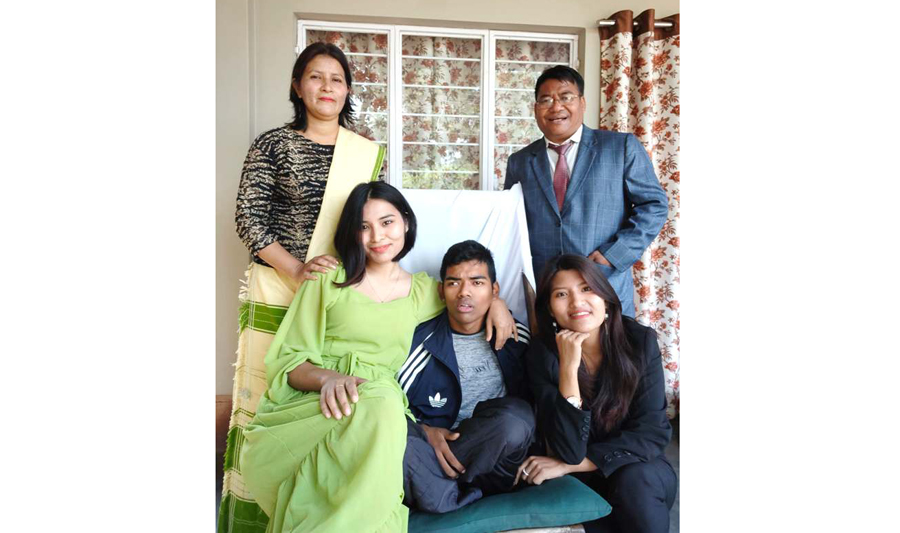Jalukie’s Keringau Pehiareudi Putlang, living with cerebral palsy, runs a thriving SIM card business, inspiring resilience and determination.
Share

DIMAPUR — On the front porch of his parents’ house in Jalukie, packets of SIM cards lie stacked in neat bundles, ready for retail. A pair of smartphones quietly charges beside them. It looks like the everyday hustle of a small-town entrepreneur—and in many ways, it is. Overseeing it all is Keringau Pehiareudi Putlang: entrepreneur, retailer, and a man navigating life with cerebral palsy.
Keringau’s story began small. In 2014, after his friend gave him the idea, he started recharging mobile phones for neighbours and passers-by. Curious by nature, he thought about how to take it further and turned to YouTube, teaching himself how to activate SIM cards.
Confident that he could manage his own business, he reached out to local distributors and set up a retail operation of his own. Today, customers not just from Jalukie but also from neighbouring towns and villages stop by his home to take out new SIM cards. His Yiyo Mobile Zone handles multiple service providers—Airtel, Jio, Vodafone Idea (VI) and BSNL—making him a one-stop point for mobile connectivity in the area.
The work is hands-on. In the middle of a conversation, a customer arrived with documents to activate a new SIM. Keringau carefully checked the Aadhaar card and proof of address before saying, “Pay me only after the SIM is activated.” He explained that he never takes payments in advance. “It’s a way of ensuring that my customers trust me and my business,” he said.
Also read: Stitching independence: Naga woman challenges disability stereotypes
His mother, Lucy Putlang, shared that Keringau was born premature and diagnosed with cerebral palsy as a toddler. He endured health complications and nerve pain until early adolescence. While he began speaking at the age of five, he has never been able to use his left hand and cannot walk. He uses a customised wheelchair whenever he goes out.
Yet learning came naturally to him. “As a child, he would listen to his younger sisters studying, and that’s how he picked up his ABCs and 1-2-3s,” his mother said. With 60% disability noted in his certificate, Keringau remained outside the formal education system, but his curiosity carried him forward.
“We never even taught him how to use a computer. Even this business, he learnt by himself,” Lucy added.
For his part, Keringau is matter-of-fact. “Anything I put my mind to, I will not stop till I achieve it,” he said.
Persistence against odds
When he first entered the trade, his persistence was not always welcomed. Telecom offices, he remembers, were often irritated with his constant follow-ups. “I used to file complaints again and again if they didn’t provide efficient services,” he said with a laugh. “But now, they trust me, because everything I do, I do thoroughly.”
Running a business has not been without setbacks. Keringau admits to losses, mostly when customers took SIMs on credit and never repaid. “Over the years, I think I have paid about INR 4 lakh out of my own pocket to cover losses,” he said.
Read more: Aadhaar barrier for PwDs in Nagaland
His concerned mother recounted how people sometimes took advantage of his disability and kindness. But he brushed it off, gently cutting her short: “I helped them when they were in need, and there’s the one above who is watching it all.”
Beyond retail, people from remote areas often call on him to sort out poor network services. He obliges by coordinating with technicians or lodging complaints with the head offices. “Sometimes, even if I can’t fix it directly, I try to connect people with the right officials,” he said.
Although he has managed so far without regular medical bills, Keringau was recently diagnosed with kidney and bladder stones. He dismissed the condition as ‘just minor,’ but his mother worries because health complications can arise unexpectedly for persons with disabilities.
When it comes to government support, the family has little to show. His parents once tried to enrol him in schemes for persons with disabilities, but eventually gave up. One incident stands out in Lucy’s memory: an organisation visited, collected documents and photographs, and promised financial assistance, but never returned. “This is not right. It leaves a bad impression about all NGOs and creates distrust,” she said.
For the future, Keringau dreams of expanding his business further, perhaps even becoming a distributor. But such ambitions require capital, and he is still looking for financial support. For now, he continues to build Yiyo Mobile Zone step by step, guided by his personal principle: “I will make a profit, but the customer should also get the actual benefit.”
(This report is facilitated by the LIC HFL Sarthak)